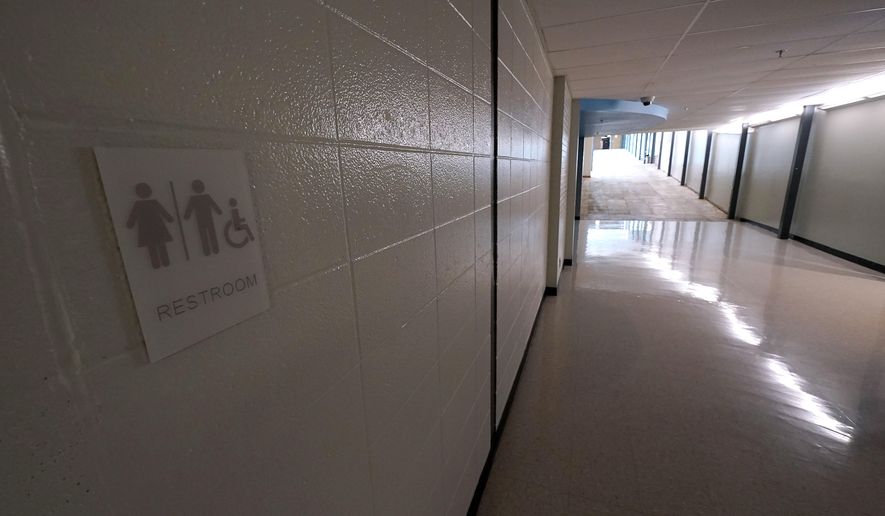The Supreme Court this week declined to consider a dispute over school restroom policies for transgender students, the second time in recent years that the justices have left in place policies that allow transgender students to use restrooms based on their gender identity.
Legal experts say the justices eventually will have to address the issue because lower court rulings have been used to create widely varying policies for students depending on where they live and attend school.
“One of the downsides to our justice system generally is, when the Supreme Court decides to take its time with significant issues, there are costs because we do end up having unequal systems of justice,” said Scott Skinner-Thompson, a law professor at the University of Colorado.
He added that it’s unlikely the justices want to take up the topic during an election year.
“I don’t think they are going to want to be seen weighing in on this debate that is already front-and-center of our political discourse this year,” said Mr. Skinner-Thompson.
For students in Georgia, Alabama and Florida, the 11th U.S. Circuit Court of Appeals has ruled that separating students into bathrooms based on their biological sex doesn’t run afoul of the Constitution or civil rights laws.
That 2022 ruling from the full 11th Circuit involved a case brought by a transgender boy who wanted to use the boys’ restroom. The student’s challenge to the Florida school district’s policy of having students use the facility based on their biological sex failed.
But the 4th and 7th U.S. Circuit Courts of Appeals have ruled in favor of transgender students challenging bathroom policies. The 4th Circuit covers Virginia, West Virginia, South Carolina, North Carolina and Maryland; the 7th includes Indiana, Illinois and Wisconsin.
In the case the Supreme Court turned away this week, a transgender boy at an Indiana school wanted to use the boys’ restroom instead of a single-cell restroom provided for students who do not wish to use the facility of their biological sex.
The 7th Circuit ruled in favor of the transgender student’s challenge, saying the school district’s arrangement violates the Constitution and civil rights laws protecting against sex discrimination.
It would have taken four justices to vote in favor of reviewing the Indiana school district’s appeal.
Josh Blackman, a professor at South Texas College of Law, noted that such cases tend to become moot when the student graduates or moves on from the school with the challenged policy.
“In this case, the student graduated from the middle school, and the high school permits the student to use a boy’s bathroom, so the case is arguably moot. There were no dissents from denial. This is a recurring problem. You may recall that in the Grimm case, the student also graduated, thus mooting the case,” Mr. Blackman said. “Even though the students have graduated, the precedent remains.”
The Grimm case involved Gavin Grimm, a transgender boy. The student challenged his Virginia school’s restroom policy, and the lower courts ruled in his favor. The Supreme Court declined to review the ruling, leaving the precedent in place in favor of the transgender student.
Justices Samuel A. Alito Jr. and Clarence Thomas noted in the 2021 denial that they would have granted the appeal.
After that denial, the high court issued a landmark ruling in favor of a transgender employee challenging a work dress code requirement, ruling that federal civil rights laws protect against sex stereotyping. The issue didn’t involve schools and was in the realm of employment concerns.
Nonetheless, some lower courts have cited the high court’s opinion in cases involving transgender students in restrooms or in sports.
Justices Alito and Thomas, as well as Justice Brett M. Kavanaugh, dissented from the work dress code ruling.
Adam Feldman, a Supreme Court scholar and creator of the Empirical SCOTUS blog, said he doubts there are five votes among the justices to reverse the lower court’s ruling in the Indiana case, suggesting that’s why the court didn’t take up the recent case.
“In the Indiana case, I’d guess there aren’t five clear votes to uphold the school’s policy and the justices in the middle which could be any of [Chief Justice John G.] Roberts [Jr.], [Justices Amy Coney] Barrett, [Neil M.] Gorsuch and/or Kavanaugh would probably prefer denying cert to taking it with the possibility of upholding the lower court’s decision,” Mr. Feldman said. “This is obviously just speculation, but it makes sense, given the history of this issue before the justices.”
• Alex Swoyer can be reached at aswoyer@washingtontimes.com.




Please read our comment policy before commenting.